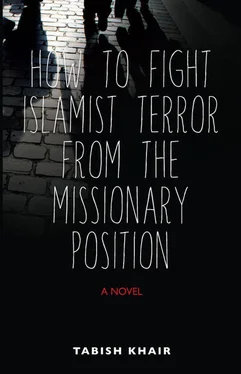But there is no doubt that, whatever the causes, both women came to Karim Bhai in an obviously emotional state.
Ravi disappeared on his bicycle soon after our Cairo conversation, hunting out both his cycle lamps and his cycle clips, which indicated his intention to stay out until night and his desire to reach his destination in a high state of sartorial elegance. He wore his favorite leather jacket and his patent gloves too. I think I was still digesting the notion of Karim Bhai once being married when the doorbell rang.
Ajsa walked in with her Somali husband, Ibrahim, and Ali, who, I had been told, was inseparable from Ibrahim. They offered only a perfunctory nod to me—my door was open and I was revising a lecture at my small study table—and walked into Karim Bhai’s room. Karim Bhai closed the door of his room behind them. This was unusual, as you know; he seldom closed his door completely. But I did not mind. I had never liked Ali, with his saliva-spraying religious virulence, and I had never met Ibrahim. In fact, I still think this was the only time I saw him: such a fleeting glimpse that when I came across his photo in the papers much later, I did not recognize the man.
For the next hour or so, I heard their voices rise and hush in argument: the high tones came from Ali and, once or twice, Ajsa. They were speaking Danish—the only language all of them really shared—and all I could gather was that they were talking about Islam and insults to Islam at least once in a while. Of course, I might have imagined this later on; at that moment, annotating my lecture on Gulliver’s Travels , I did not really pay them too much attention.
Perhaps I really noticed that they had been arguing when Ali stalked out and, banging both the doors shut, left the flat.
Ibrahim followed him less than a minute later, leaving the door to Karim Bhai’s room ajar. But this, of course, was not sufficient for Karim Bhai. I heard him come to my door. He scratch-knocked on it and then put his head in, beard first. “Would you like to join Ajsa and me for a cup of tea?” he asked.
I had almost finished revising my lecture and, in any case, I was curious about the argument. I joined Karim and Ajsa in his room. She was sitting on the sofa. It looked like she had been crying. There were two plastic folding chairs—Karim Bhai kept six piled in a corner for his Quran sessions—next to the sofa. I took one of them. Karim Bhai bustled around, brewing tea. He was in such a rush or so agitated that he brewed it the Danish way and brought it in on a tray, with a pot of sugar and a carton of cold milk from the fridge.
Ajsa did not say much. Mostly they talked of the weather. When she got up to leave, Karim did something unusual. He put a hand on her shoulder. I wondered how many brownie points this gesture cost him in his paradise. She was a bit taller than him, so he had to look up at her. “Don’t worry,” he told her, squeezing her shoulder gingerly, “I will take care of it. I will talk to Ibrahim soon.”
The second female visitor Karim received that Sunday was just as unexpected. She had been there before, of course, but never so abruptly, and in such mental disarray.
I had agreed to cook dinner. Karim Bhai ate around Danish time, and we had gotten used to it too. It was a bit after six in the evening.
My cooking is not as elaborate as Ravi’s or as practiced, if limited, as Karim Bhai’s. I usually slice onions, tomatoes and whatever else might be within slicing distance, fry it with chicken or minced meat or, in Denmark, salmon, add salt according to taste as they say, and finally plop in a bottle of Uncle Ben’s jalfrezi or some such ready-made mix of spices. It goes with rice, seldom Basmati, or pasta.
I had just plunked in Uncle Ben’s korma mix when the bell rang. Karim, who was puttering around tidying up the flat, both TVs showing the same Danish news, went to open the door. There were muttered exchanges in Danish. I assumed it was some neighbor or a Jehovah’s Witness. But in a few seconds, Karim re-entered the kitchen with Pernille, Great Claus’s wife from upstairs.
“Perhaps Pernille can eat with us,” he said to me.
Pernille declined, but we insisted; she looked tired—the Eng Lit description, in Ravi-speak, would have been “haggard and woebegone”—and did not need much persuasion. Karim Bhai bustled about in the kitchen, relieving me of the chore of cooking the rice. Karim Bhai cooked only seven or eight dishes—halal restrictions curtailed his scope—but he cooked them well and always in a pressure cooker. I didn’t, dreading its whistle and the hint of a coming explosion. The rice, thanks to the intervention of Karim and his pressure cooker, was ready much quicker than it would have been if I had cooked it.
After the table had been laid and the rice and curry placed in the middle, we plied Pernille with the fare. She pecked at the food, only perking up once to compliment the cooking. It was sheer politeness.
“Where is Claus Bhai?” asked Karim Bhai finally, perhaps just to break the awkward silence.
“I wish I knew,” replied Pernille, with some asperity. “I thought he might be here. That’s why I knocked…”
Claus did drop in regularly—the only Dane I ever met who did not require an appointment at least a week in advance—and sometimes he and Little Claus joined us for dinner or lunch. But we had not seen him that day.
“He must be working,” suggested Karim Bhai.
“If only…” said Pernille. But then, with characteristic reserve, she changed the subject.
Later, after she had left, Karim Bhai looked at me and shook his head.
“Things are not going well between them,” he said to me.
I was not sure: Pernille sounded like a woman who had unconsciously or consciously compromised on her career for the sake of her children, and the children had inevitably flown the coop.
“No, no,” replied Karim Bhai, “I have known them for many many years. Things have not been good between them for a long time.”
“Why, Karim Bhai?” I could not help asking.
Karim hesitated. I knew he avoided anything that resembled gossip. Then he said in a low monotone: “Pernille thinks that Claus is having, that Claus is… (He lowered his voice a bit further, so much that I had to crane forward to follow him)… seeing another, you know, another woman.”
He blushed. It had cost him effort to mention the possibility. And he hastened to add: “But, of course, he is not. Claus is a decent man. It is just that, here, you know here… (He waved his short arms around to indicate all of Denmark and perhaps all of Europe)… here everyone has such suspicions, everyone is always afraid. I keep telling her that it is not true, and she keeps saying that she will never forgive Claus if, after all these years, he leaves her for another woman.”
I did not see Ravi that night or the next morning. He must have slept over somewhere else. But he walked into my office on Monday afternoon and said, in lieu of a greeting: “I ran into some of your Eng Lit First World types in the psycho canteen. I think I will avoid the place in the future: it is infested by Eng Lit types.”
“Why, what did they do to you?” I asked, not really interested. I knew it was just a prelude to banter for Ravi.
“Do? Eng Lit First World types never do anything. That is why they are Eng Lit First World types. You see, bastard, I was having this gloriously political conversation with some guys from the French and Spanish departments, when in walk a group of Eng Lit types. They know some of us, so they join us; I continue lambasting Mubarak and the Egyptian army and the Twitter Twister. Then in steps one of your Eng Lit types with his two cents of political observation and quotes Yeats. Can you guess what he quotes?”
Читать дальше












